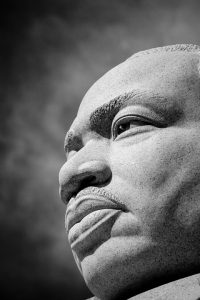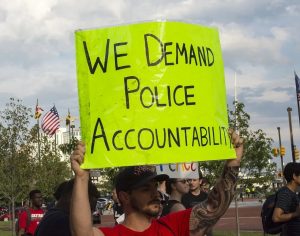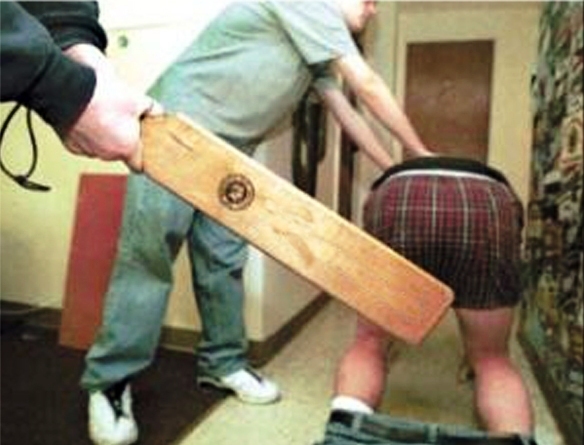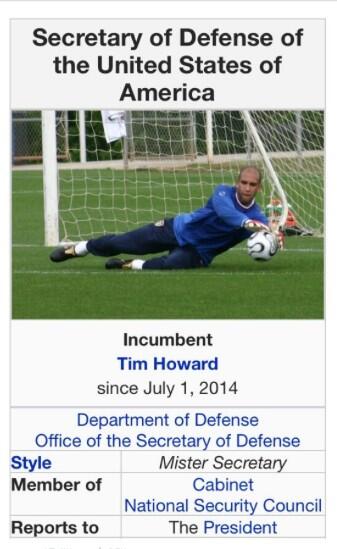The Pros and Cons of Riots
People keep saying, ‘It’s horrible that an innocent black man was killed, but destroying property has to stop.’ Instead try saying ‘It’s horrible that property is being destroyed but killing innocent black men has to stop.’ – Randall Telfer
 In 1966, a Gallup Poll revealed that almost two-thirds of Americans had a negative opinion of Dr. Martin Luther King Jr. And in 1968 – the year he was assassinated – that number had jumped to 75%.
In 1966, a Gallup Poll revealed that almost two-thirds of Americans had a negative opinion of Dr. Martin Luther King Jr. And in 1968 – the year he was assassinated – that number had jumped to 75%.
Today, of course, those views have starkly reversed. Both individuals and organizations commonly praise him for his non-aggressive approach to protest and cite it for the movement’s success.
But that’s today’s perspective.
Back in 1966, when White Americans were asked what they thought of MLK’s civil demonstrations (e.g., sitting in White-only sections; his marches through cities), 85% of people thought it would ‘hurt’ (vs. ‘help’) the advancement of African Americans’ civil rights.
IS RIOTING WORTH IT?
To many, the current protests and riots against police brutality toward minorities are perceived as counterproductive to attaining public support. And according to research, that is correct.

As one example, the researchers had participants read a news report about a Black Lives Matter protest that either (1) made aggressive chants against the police (extreme protest), or (2) made chants against racism (moderate protest). Afterward, participants reported that the extreme (vs. moderate) protest was more immoral, which reduced participants’ identification with and support for the movement.
In other words, more extreme protests can indeed hurt the public’s opinion of the movement.
But that’s not quite the full story.
Further in the article, the researchers find that extreme (vs. moderate) protests primarily hurt the public opinion of those who already oppose the movement itself.
PERCEPTIONS OF THE MOVEMENT

For example, in regard to protests, the researchers from earlier found that conservatives (vs. liberals) tended to be more opposed to extreme Black Lives Matter protests; however, liberals (vs. conservatives) tended to be more opposed to extreme anti-Abortion protests.
These findings highlight how our own opinions toward the movement itself can determine whether or not we are supportive of extreme protests. For example, if you strongly oppose gun regulation laws, you would probably be more tolerant or even supportive of extreme protests in opposition to those laws.
Indeed, other research highlights how a person’s identification with a movement can impact their perceptions about the protest’s ultimate goals.

So, do you believe Black Americans experience a disproportionate amount of police brutality? And if so, how negative are you toward such instances of violence? Your answers to these questions likely influence your opinions on the protests and riots today.
BLACK LIVES MATTER
For many White Americans, they perceive that the treatment of Black Americans (be it by the police or otherwise) is better than Black Americans claim it to be. Of course, unless you or a close loved one is Black, you will witness fewer racist encounters, leading you to think things are not that bad.
But facts and statistics indicate otherwise. Black Americans – be it in job applications, insurance claims, interactions with the police, etc. – experience persistent discrimination even to this day. However, if you do not believe Blacks are treated meaningfully worse than Whites, you will likely interpret the movement as a whole differently.
That is, you might interpret “Black Lives Matter” to entail “Other Lives Matter Less.” However, the movement itself simply wants to convey that Black lives matter, too.
For example, if you said protecting the rainforest matters, it doesn’t mean you think “other forests matter less.” You’re simply acknowledging that rainforests have been suffering more than other types of forests, and so we need to give them special attention right now.
Thus, with police brutality, these protests are asserting that police brutality is ALWAYS bad no matter your race, but it is happening at a disproportionate rate to Black Americans.
Again, though, if you don’t believe the facts and statistics supporting the inequal treatment of Black Americans by the police (i.e., you believe Blacks and Whites are treated fairly equally), you would be inclined to believe that the Black Lives Matter movement itself is inappropriate.
And as we saw above, how you identify with the movement in turn influences how you view the protests.
ARE THE RIOTS JUSTIFIED?
Although many don’t realize it, Martin Luther King Jr. once said: “A riot is a language of the unheard.”

And the issues with police brutality? Well, those didn’t change a whole lot, either.
Riots don’t materialize out of nowhere. They are the last resort of those who have continued to be ignored while their rights have continued to be trampled.
Do you think people could really get this angry and motivated if justice was in fact being upheld? In a shortlist of 10 high profile incidents where Black men and women were wrongfully killed – Breonna Taylor, Philando Castile, Alton Sterling, Stephon Clark, Freddie Gray, Eric Garner, Sandra Bland, Tamir Rice, Rekia Boyd, Trayvon Martin – do you know how many of those culpable for their deaths were held accountable?
Zero.
So, while I do not condone violence or looting, I can understand the extremity of the protests today – and why they could feel necessary for real change.
That is, even though I began this post talking about how extreme protests can be ineffective at generating broader public support, the same researchers who demonstrated that point also discussed how extreme protests can actually be effective in making change happen.
Extreme protests not only get more media attention (which spreads greater awareness), but they also apply pressure to the people who can actually change things. Even with a majority of public support, real policy change only happens when the people with power (i.e., big corporations, high-level politicians) actually push for it.
Now, obviously no one wants such change to have to come down to a riot — nor am I asserting that this is the way to achieve change — but I do hope that after reading this post, people take some time to really consider the positions and motivations of these protests and riots. For in the end, we should all want to do whatever we can do to attain a society with the greatest safety and equality for all.
Thoughtfully,
Jake
Everyday Psychology: In instances of police brutality (e.g., the murder of George Floyd) people often claim that it is a one-off incident. For example, the police officer who committed the murder (and the other three officers who served as complicit accessories to murder) were just “bad apples.” But if you look at the complaint sheet against the officer who murdered George Floyd, you would find that there had been 18 complaints previously filed against him – only two for which he had received “oral discipline.” In fact, had there not been such public outcry, there probably would have been no consequences for him according to the initial, “official report.” That is, the officers initially tried to claim that George Floyd “resisted arrest” (which camera evidence disproves) and that he died “from complications at the hospital” (which onsite EMTs and an autopsy disproves). Thus, even if you want to contend that this police officer and his accomplices were just a convenient bushel of bad apples, clearly there need to be systematic changes to policing that prevent such abuses of power that further move to hold these men and women accountable for their actions.
Feinberg, M., Willer, R., & Kovacheff, C. (2020). The activist’s dilemma: Extreme protest actions reduce popular support for social movements. Journal of Personality and Social Psychology.
Teixeira, C. P., Spears, R., & Yzerbyt, V. Y. (2019). Is Martin Luther King or Malcom X the more acceptable face of protest? High-status groups’ reactions to low-status groups’ collective action. Journal of Personality and Social Psychology.








When I said MLK didn’t support violence I meant against any living thing not objects.
The Buddhists have a saying. “There is No way to peace, peace is the way.” Can you really justify life by the taking of life? As had occurred to other blacks that resulted from these protests? It seems that these protests have spawned gratuitous looting for profit at the expense of a black life; using that life as an excuse to justifying hurting other black lives. I favor violent protests by the way in support of change. Burn vehicles if needed. But don’t harm any living thing. MLK knew that desperation can lead to riots but that does not mean he supported violence. So please don’t obfuscate his message
Hi Antonio! Thank you for the very thoughtful response; I really appreciated it 🙂 Now, let me begin by stating that I do NOT condone violence of any kind toward other people nor any of the looting. I’m sorry I didn’t make that clear enough in the post. As I wrote (or at least intended), I don’t think violence against other people or looting of any kind is justified, something I think we both agree with.
As to MLK’s message, I did not invoke him to try to convey he supported violence against people. I brought him up for two reasons: (1) to show that perspectives on his actions have changed radically over time, and (2) to show that even he came to realization that entirely “peaceful” protests can be insufficient. I mean, even after his peaceful protests, he was still murdered at the end of the day.
Again, I would hope things would never get this bad, but consider this analogy. Let’s say it’s freezing outside when you got locked out of your warm house. You try pounding on the door and shouting for the people inside to let you in, but they can’t hear you over the TV. Eventually, your only choice is to try to break a window or smash a door or do *something* to get them to hear you. Naturally, you’d prefer not to have to do any damage to be heard, but if people aren’t listening and you’re dying, stronger actions need to be taken.
With the current protests, the damage to property felt like the only way to get people to let Black people “back into the house.” As I began this post with that quote: the destruction of property is horrible but the systematic oppression of Black people has to stop.
Funny enough — and in parallel — I will note that when I studied abroad in Thailand, I wrote a similar post calling for the oppressed village members to engage in civil disobedience. Although that post was eventually pulled from the program’s website, I think the message rings true no matter where you are in the world. Sometimes you have to take more “extreme” measures to get people to listen to you.
Again, thank you for your comment and sharing your voice. I welcome any further comments you might have.